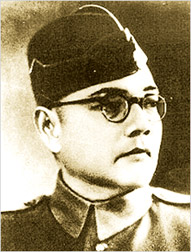Optimistic national patriot of Indian Independence struggle
- Subhas Chandra Bose -
Premasara Epasinghe
Imperialism can be defined as a Policy of extending a country’s power
and influence in the world through diplomacy or military force and
especially acquiring colonies. The British Imperialism covered. India
and Ceylon for centuries. It was in late 1940s. They gained their
freedom to a certain extent. India gained their Independence after a
bitter struggle, sacrificing many lives in their freedom struggle. As a
student of Indian History, I presume, the Indian National Patriotic,
National leaders fought their tooth and nail for many years to gain
their freedom. Further, I fell there is no other country then India who
fought bitterly to gain their freedom from Imperialism of the British
Rule.
 The Republic of India is the world’s seventh (7) largest country,
second most populous after China. Its area consists of 3,287,590 sq km
(1,269,338 sq miles). It’s a massive big country. Therefore, they had to
fight hard. The Republic of India is the world’s seventh (7) largest country,
second most populous after China. Its area consists of 3,287,590 sq km
(1,269,338 sq miles). It’s a massive big country. Therefore, they had to
fight hard.
Among those reputed leaders who fought for Indian Independence were
Mahatma Gandhi, who is considered as the “Father of the Nation”, Gokhale,
Pandit Shri Jawaharlal Nehru, Sarojini Naidu and Founder of Indian
National Army – Netaji Subhas Chandra Bose.
The Great Revolutionary Indian National Leader Subhas Chandra Bose,
was born on January 23, 1897 in Cuttak, in Orissa State, India.
Subhas Chandra Bose, studied at Presidency College, Kolkata. He
entered the university of Kolkata and obtained a First Class Honours
Degree in Philosophy in the year 1919. He was keen to join the Indian
Civil Service. Therefore, he proceeded to England in 1920. Subhas
Chandra Bose passed the Civil Service Examination and he was ranked
number four in the list. A fine performance indeed.
Prominent figure
This optimistic leader, Chandra Bose, played a vital role as a
Revolutionary Leader and a pioneer in the Independence struggle of
India. He served India as a British Civil Servant till 1921, and
relinquished his duties and joined a National Movement. From the
inception, he supported the Indian Freedom struggle, and fought against
the British Rule in India.
Subhas Chandra Bose was instrumental in elevating his “Guru” Teacher.
Prof C R Das, to the Mayorship of Kolkota. Chandra Bose served as the
Chief Executive officer of Kolkata Municipality. After his teacher’s
demise, Subhas Chandra Bose became the leader of Bengal.
Bengal
It’s a region of India which lies in the deltas of Ganges and
Brahmaputra Rivers. Bengal was the richest region in the 16th century
Moghul Empire of Akbar I (Great). Bengal was conquered by the British in
1757. It became centre of British India, with present Kolkata as the
capital. It was made an autonomous region in 1937 and present Boundaries
were fixed in 1947. Its area is 200,575 sq km (77,442 sq miles).
Even, when he was the chief Executive of the Kolkata Municipality, he
was imprisoned by the British Indian Government staging civil
disobedience against them. After he was released, he contested a seat
and was elected to the Executive Council of Bengal.
He was a dynamic leader. He held the post of President Indian Trade
Union Federation, chairman of the Indian Youth League and in 1938 Subhas
Chandra Bose was elected as the President of the Indian National
Congress. Again in 1938, he was re-elected to INC, but resigned to gain
Economic Freedom. Subhas Chandra Bose was always an active and a dynamic
personality. He did not appreciate the slow progress of Indian Freedom
Movement and he resigned from National Congress.
In 1939, he formed a “Progressive Front” and announced a “National
Week.” The British Government arrested him, kept him in House arrest
charged him for disobedience by the British Regime.
This adventurous leader Chandra Bose, fled the country and proceeded
to Germany in 1941. Thereafter, in 1943, he went to Japan and assumed
duties as the Chief of Indian National Army of Behari Base.
Optimistic Indian
This Great Indian leader, Subhas Chandra Bose, was a True Indian
Patriot. He coined the Great National Term - “Jai Hind” to be used by
National Indian Army and also introduced the Nationalistic Hind Terms -
“Jana” - “Mana” - “Gana” words, which were used by the Indian National
Army. The Great Indian Leader and Patriot, Subhas Chandra Bose, served
as a Prisoner for more than ten years, as he fought against the
Britishers. He was imprisoned about eight times.
Subhas Chandra Bose, who sacrificed his whole life as a great Patriot
to “Free India”, died at the age of 48 years, in Taiwan due to a plane
crash.
Lives of Great Men,
All Remind us,
We can make our Lives Sublime
And Departing, leave behind us
Footprints on the sand of time |





